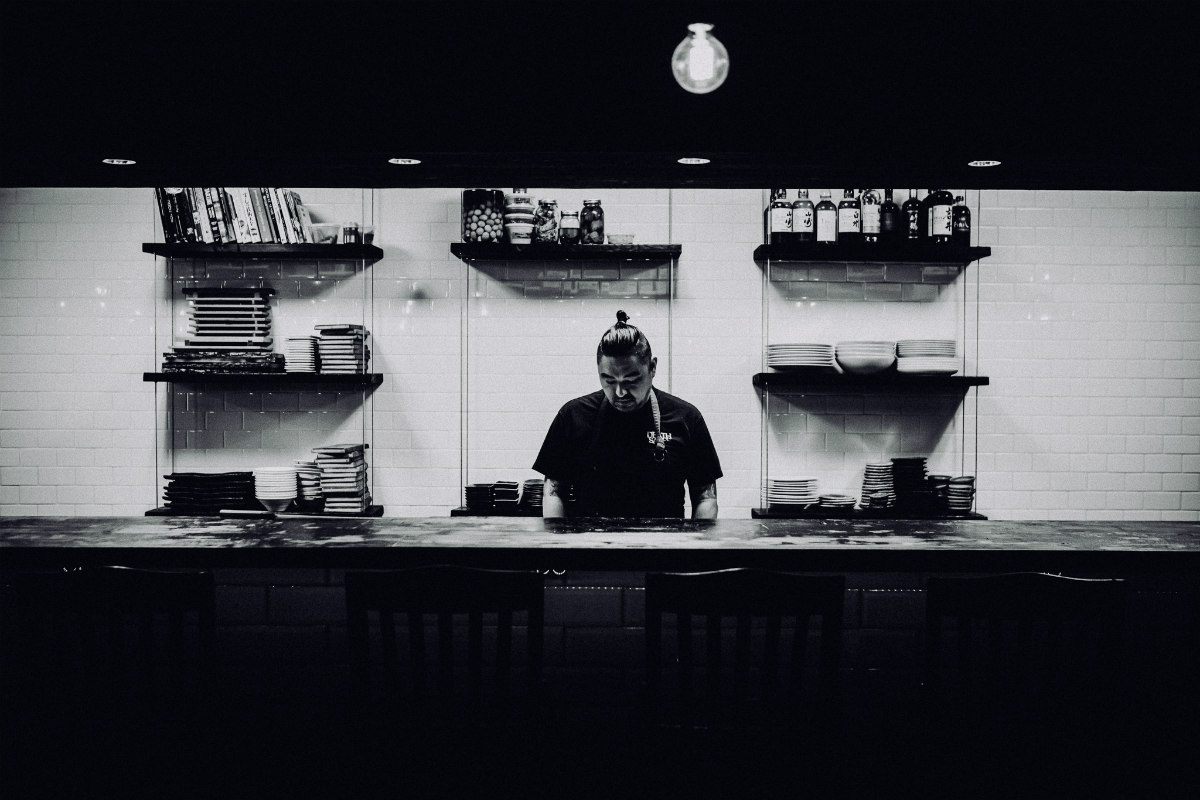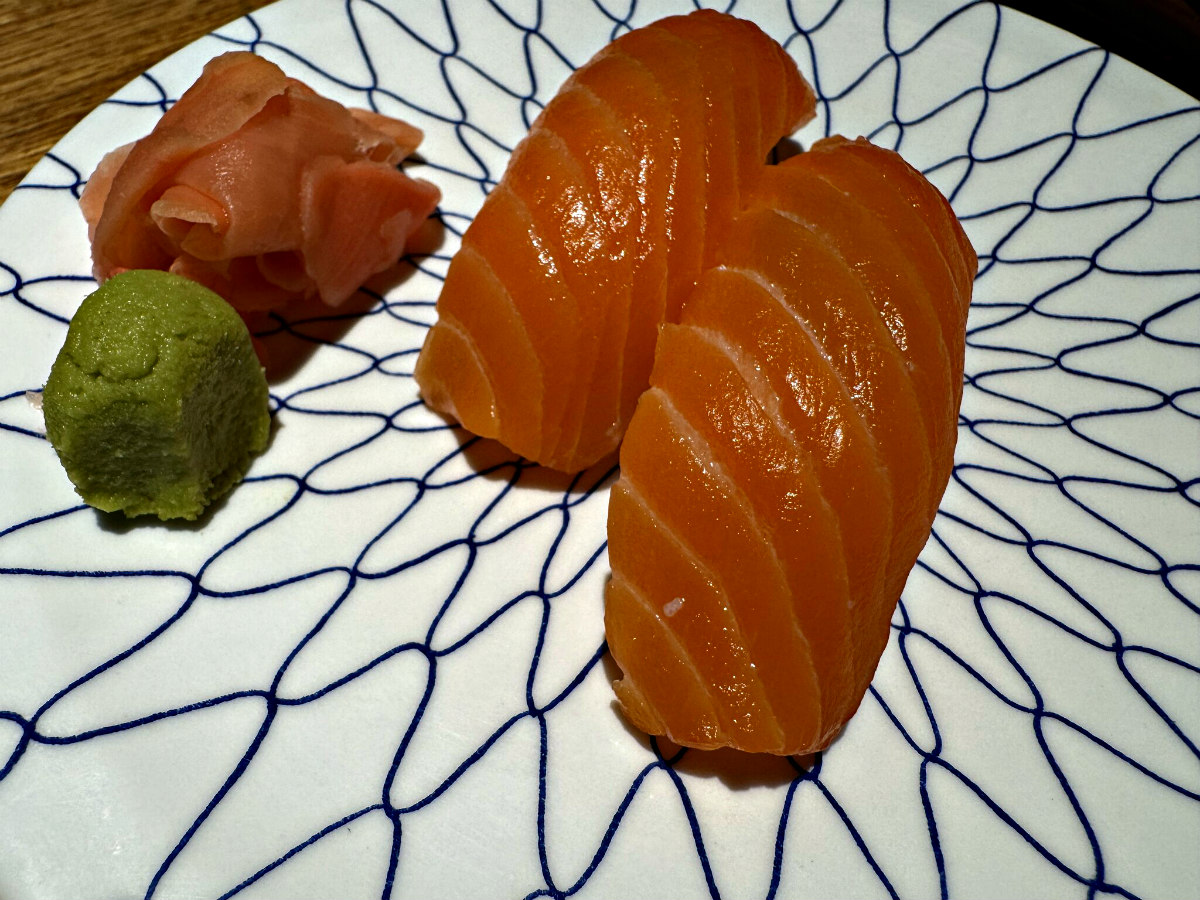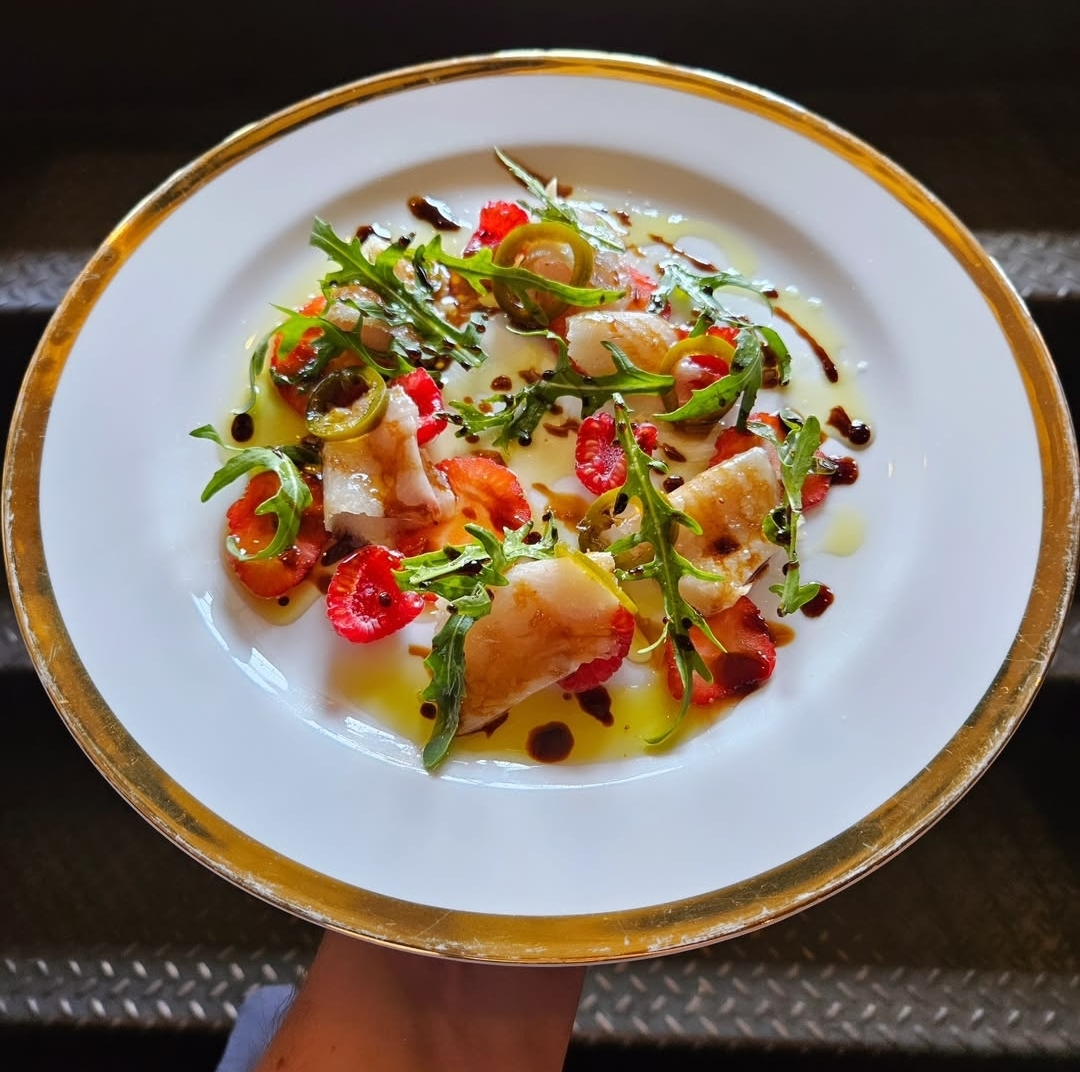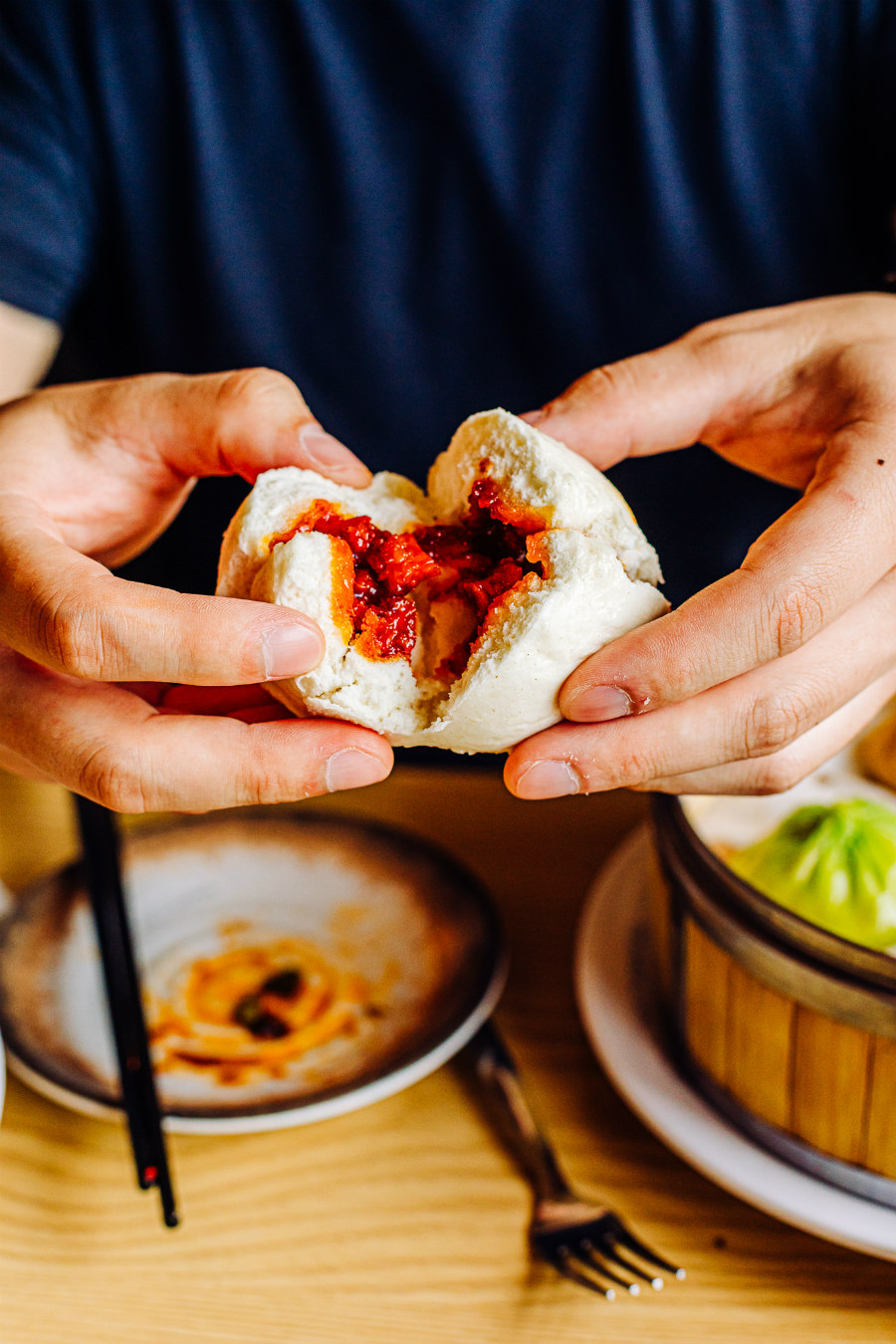I am so thrilled to share chef David Utterback’s recent column for “Food Street,” a new regional food magazine, to my readers. I’ve gotten to know Dave during the past two years, and he is one of the restaurateurs in Omaha doing the most to push our food scene forward. He’s also a dynamic chef and personality. I love sitting at his counter, eating his food.
When he sent me a link to this essay, I wanted as many people as possible to read it. I hope you will.
I’ll also be a contributor to Food Street, and I hope you’ll check them out and follow along.
— SBH
Sushi in the time of Coronavirus
By David Utterback
I remember visiting my mom.
I made her prisoner in a nursing home a few years ago, after the stroke took her body and the dementia clouded her mind. It was one of the first real days of spring. A classically chilly-crisp Nebraska morning. The sun shining hard, melting the last remaining pockets of snow that hadn’t found refuge, hidden in the shade. Cold enough to wear a jacket, but I wasn’t because no snow means no jacket. That’s Midwestern law.
Like all nursing homes, it was closed to visitors by then. I snuck around the outside of the building, tiptoeing around the unraked, leftover leaves from last year. I found her window, tapped on the glass, and grinned. A faked grin, but she didn’t know that. She was sitting quietly, head down, her unbrushed black hair left to fade grey and white by the staff. She was motionless, asleep maybe, hands in lap. A few moments passed before she turned and noticed me.
Confused, her mind searched the handful of remaining memories, struggling to match my face with the baby she raised all those years ago. Her boy, now a man, the one she thinks has forgotten about her. The one that doesn’t visit, even though he does, every week, Whopper Jr. in hand. She just can’t remember. A smile starts to form, the neurons finally making the connection. A laugh I can’t hear hits the glass. I move to wave, but the laugh runs from me. She turns away, the connection broken, head down again and is gone. The mid-day cable programming she is parked in front of steals her back. I fled. I fled back to restaurant, back to the safety of my work.
Among all the uncertainties of life, one constant is that there is always work to do in a restaurant, no matter your job. As the saying goes, “if you’ve got time to lean, you’ve got time to clean.” From top to bottom, from owner to dishwasher, you can never and will never finish the list. As all of them seem to be these days, another constant is surrendering to the chaos. I’m running out of big projects at the restaurant. I’m even running out of the day-to-day stuff. I am down to those things on the list you always mean to get around to doing but remain years later. There are certainly more pressing things to be done than detailing the glass top of an induction burner with a razor blade for two hours. As a high-functioning procrastinator, I have now decided this is the most important thing I can do right now.
When the call came to restrict capacity in my restaurant, I was preparing for a private omakase, an 18-course personal sushi dinner for four, that a good friend had booked. That four-top included two well-respected chefs, both of whom I looked up to and wanted to impress. I was going to “style them out,” as we say in the business. We’re talking dry-aged fish, specialty seasonal items flown in from Tokyo and Fukuoka, an ultra-rare variety of rice, artisan-brewed shoyu, weasel hair sauce brushes handmade by an old Japanese grandma in Akasaka, decade-old boutique Japanese vinegar, and so on. I was really gonna “bless em,” as my younger chefs say. Some real Michelin-star soigne shit for four people in the middle of Omaha, right at the onset of a panic-inducing, toilet-paper-hoarding global pandemic.
Like every other restaurant owner, I ran the numbers.
Then I pretended things couldn’t be so bad and ran them again.
Then again.
I ran as many scenarios as I could. The spreadsheet will show you the way. No scam, calculator or Excel formula revealed a path forward where we could support anyone, including myself, without losing the business I worked to build my whole life. Even paying staff a measly sum of $100 a week would bankrupt us within a month. I didn’t decide to lay off staff, the decision was made for me.
I heard stories about other restaurants having emotional staff meetings and long, heartfelt goodbyes over video-conferencing software. I fired off text messages like a shitty boyfriend who couldn’t look their partner in the eye and tell them it wasn’t working out. Most of the staff knew it was coming. Some of them actually told me they were sorry for me. They just lost their job, and they we’re sorry for me?
That just made it worse.
These four walls and this counter was my dream. They were helping me build that dream, and I let them down. I took a half bar of Xanax, prescribed by a veterinarian for a friend’s geriatric dog. I drank a bottle of wine and cried as quietly as I could on the couch, while my wife and small children slept. My son ran to the bathroom in the middle of it. I don’t think he saw me. I hope he didn’t. Who wants to listen to their father cry while they pee? I’m sure that’s somebody’s thing, but this is a no judgement space.
Was this my fault? I mean, who could be so financially irresponsible that they don’t keep a $100,000 three-month emergency fund, just in case the government orders a mandatory closure of businesses due to a fast-spreading virus? Restaurants, it turns out. All of them.
I scheduled one chef and the manager for the first night of our carryout-only service. I forecasted $250 in sales. We got absolutely destroyed. I mean, lit on fire and left to ash, like a cigarette abandoned by a drunk choosing songs on a jukebox, back when everyone smoked in bars. You have to be old enough to remember doing that kind of thing, I guess. If you aren’t, use whatever generational metaphor you think appropriate. Probably something involving a TikTok?
Guests and delivery drivers were standing around, unsure what they could touch. The phone ringing nonstop. I mean nonstop. Delivery tablets playing their super-fucking-annoying chimes. We piled up unacceptable ticket times. We had passive-aggressive conversations about our systems. It was, as they say, “On.”
My peers and fellow chefs set out immediately to convince the world that restaurants needed to be saved. People agreed. They formed groups and committees. They lobbied congress. They made passionate videos about how dire our situation was. I just watched from the sidelines as my friends and colleagues “pulled the goalie” and went full-court press to save our livelihoods.
How did they even have the time for this? Hell, where did they summon the energy for that? In my space, I was neck deep in water, bailing out a slowly sinking passenger ship who just rammed into an iceberg. Like Leo, I didn’t get offered a door to ride on either. I was being pulled under to slowly drown by the icy depths of the Atlantic. That may be a bit dramatic. It probably is.
Within a week, we figured out the systems to execute this new reality. We tentatively brought back most of the staff. Tips were generous. We grew mustaches. The government was poised to bail out small business. We were down a hard 40% after that first week. Then came a steady decline for three weeks. Then a flat-line. Other places around us we’re closing the doors, either due to concerns about safety or because reinventing the entire concept of your restaurant every single week is nearly impossible. When they did close, it felt like a judgement against what we were doing. The internet sent them praying hands emojis and commended them for their bravery in these times. The early generosity waned. Tips fell off a cliff. We expanded to lunch to make up for it. We opened up on Mondays to claw our way back. All of these were the things I said I would never do. It was double the work for half the money. Then came the questions. Did I care too much about my business? Did I not care enough about my people? Maybe the ones who closed the doors were right?
A month before we closed the dining room, the prestigious James Beard foundation gave us a long list nomination. I was never sure of the polite, appropriate way to coalesce my feelings about this. Something like “We never expected to get a nod in the first place. We don’t have the investors, facility, deep pockets, or big city food media connections to actually compete for any national award, so does it even really matter?” Here in Omaha, we have no food magazines. We have no weekly dining zine. Also no dedicated food writer in our paper. All of which are things that matter when it comes to something like this. Buzz must be built, lists must be shared. Other things that we don’t have at my restaurant: a kitchen. We have no fryer, no range, no flat top, no broiler, no brigade, and no expensive combi oven. We got a national nod on the shoulders of a toaster oven, a torch, five maxed out credit cards, and some Japanese steel inside a hastily converted old Subway sandwich shop of which some forgotten corners still smell of that disgusting fennel from their seven-herb bread.
Despite all of that, I won’t lie: I had a small hope we would sneak through and advance. I knew only a handful of restaurants run a program like we do. The Omakase here may not have a rival, outside of an 18-hour drive…7 hours at the very least. We are fairly unique. Not just in our region, but maybe in all of middle America. Whatever. Who cares? We can’t do anything now. Not since the virus killed fine dining and made Thomas Keller a villain. What are we judging this year? My kitchen-sink maki rolls made for a to-go menu? Hour-old tuna nigiri deliveries? Can a restaurant that serves eel sauce even qualify? What I’m saying is, who will stroke my ego while I make this California roll?
Many questions there are. Answers I have not.
In the early hours before the chefs show up, I strategize quietly in the dark atop the cold stainless-steel line coolers, black coffee tan from way too much creamer. I listen to the equipment hum, rhythmically cycling on and off. I imagine what my industry looks like from on the other side. Can full-service only spots work? My spreadsheet says they can’t. Before this, guest tips offset server wages. We ran with a standard 30% labor cost. Because of the recently passed PPP loan, for the next eight weeks, we get to test drive how restaurant wages should work. The hourly wage we pay to cooks, servers, and others puts our labor cost at around a stomach turning 60%. If we ran this program at these current menu prices, we’d be out of business within a couple months. Would guests be willing to pay $9 now for something they were spending $6 on before? The truth is laid bare: The old ways don’t work unless you exploit someone in the chain. Somewhere, from food to people, value needs to be stripped out and converted to cash.
My restaurant was thriving. We were known for our counter service and a casual fine-dining experience. The beating heart of a suburban sushi bar is the maki roll and it’s always been the part I wished we could throw back into the ocean. Before all of this, I played around with the idea of losing it altogether, we took steps to. Now that Midwest kitchen-sink maki roll is the only thing keeping this place alive. As we wait for the all clear to return to our dining rooms, I fear for my friends on the sidelines still waiting to go back to “business as usual.” Maybe “normal” does come back for a couple of months. But what if it doesn’t?
What about the “second wave” of the coronavirus? What about the third or fourth? Can full-service dining rooms and their sommeliers outlast the race for a vaccine? After our guests spend a year or two eating takeout food, what percentage will come back to the table? Will my guests expect those typical sushi bar menu items we pushed during this time and shun the fancy, interesting food we were selling before? When will it be acceptable for elite Yelpers to start leaving shitty reviews of takeout food? When the small operators die, will we all be pushed back into the chain-dominated market we spent a decade crawling out of? Is prophecy finally fulfilled? Will Taco Bell win the franchise wars?
I’m out of doggie Xanax.
Part of the day now is spent at home, pretending to relax while feeling guilty I’m not at the shop. Conversely, I spend my time at the restaurant feeling uneasy that I’m not using this opportunity to spend more time with my family at home. In the evenings, I watch my children play, digging in the dirt and investigating our little backyard from the relative safety of our home. Blissfully unaware that our neighbors are hoarding sanitizer and toilet paper. I try to play catchup to my wife, who is two or three glasses of wine ahead of me. She seems increasingly more tired each night, as we listen to what is either fireworks or gunshots from our back porch.
I visit multiple grocery stores a day, armed with a mask and a pocketful of sanitizer. Quickly searching for whatever the restaurant has used up or my vendors short on, all in a quest to ensure my city has access to a decent spicy tuna roll. I spend quiet afternoons working in my office writing menus and concepting new dishes for when our hibernations end. I contemplate taking the “disinfectant challenge” while listening to the muffled sounds of the staff as they hand bags of sushi to an army of disproportionately Sudanese delivery drivers.
I read about industry forecasts and expert warnings of a drawn-out 12-18 months. It could be two years before we’re whole again. They call it “the hammer and the dance.” I make the most elegant spreadsheets and plans to mitigate exposure while trying to maximize dollars. We have decided to keep our dining room closed despite getting the go-ahead to reopen from the government. We’re not even at the peak of the curve yet here. If we open up early, what the fuck was this all for? When the money runs out, we’ll be forced to.
I can’t help but think about mom on the other side of that window.
Will she even remember my face the next time I hold her hand? Will the last crumbs of English be brushed from the table before she hears my daughter’s voice for the first time? How much of the time we had left will I be cruelly robbed of? Will I be financially forced into doing all the things I fought against, the aspects that bother me about my cuisine? Will this pandemic steal the reputation and personality we’ve built? It’s just food, does what we do even matter? I’m not sure what’s waiting. I just know it won’t be the same.





9 responses to ““Sushi in the time of Coronavirus”, an essay by chef David Utterback”
Wow! David you are not only a brilliant chef, but you are one hell of a writer. You have let us peer into your heart and soul and I’m rooting for you and the restaurant to thrive again. It touched my heart when you talked about your mom, I can’t imagine the gamut of emotions you are experiencing. Your passion for food is obvious and should always be your compass. Hang tough brother.
Wow this was incredible to read. It is hard to understand as someone who just co.es in for the spicy tuna roll. But I can’t imagine the sacrifices you all are going through. I hope you and the rest of Omaha amazing food scene come out of this stronger then ever, or at least still standing
Your article tore at my heart. Your writing is incredible. As one who has tasted your food, this loss right now is extremely sad. I too wonder if normal will ever happen again. Thank you for your honesty
don’t worry Dave. We’ll be back. Promise
This needed to be written. Most people who are not in the business (or business period) have no clue what it takes to own an operation. Quit complaining when something goes up a dollar. Utilities increase, insurance increases, etc. just like everyone who is not in the business. Hang in there and I feel for you. Hopefully, the industry will return even stronger. And a big thank you to the customers who gave the big tips because they want you to still be here. Prayers for your Mom and you and your family.
You put into words what every chef/owner in town is thinking. Usually when a restaurant doesn’t make it, the numbers , or the food quality, doesn’t match the customers needs. Usually an astute owner sees it coming and has a chance to correct it. This time no chance to see it coming and no chance to correct anything. Life will never be the same in America. Dave thanks for your very heart rendering and insightful writing God bless you and your family and everyone that works with, and for, you .
Wow…brilliant!
You are, as Anthony Bourdain was referred to in the initial NYT review of “Kitchen Confidential”, “a force of unruly nature”
Congratulations on you being you! Bravo! and, Cheers, Chef!
Wonderful piece. Wonderful writing. Tasty in fact. It’s never just food. It’s a grin through a window. Thank you.
Wow. You are a brilliant writer. Please write a book, seriously. I can’t wait to have your sushi. I’ve always wanted to. We will survive. I work in skilked care…sending prayers for your mom.